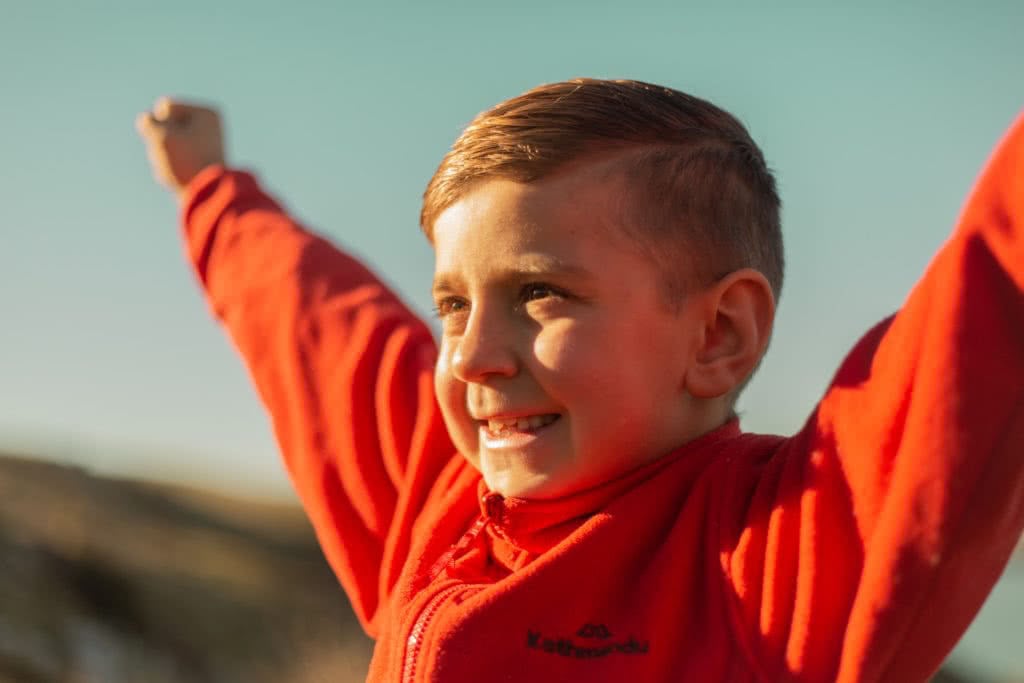Want To Raise A Courageous Child? First You Have To Teach Them To Tolerate Their Anxiety

Courage doesn’t come naturally, and is never easy for an anxious child. A courageous child has learned that courage is a choice that can be practiced. An experience that follows from fear and anxiety, courage is fundamentally the decision to focus on something more important than fear.
Especially for an anxious child, when facing something hard and scary, courage gives him the boost he needs to face it front and center. Practicing courage builds confidence, which in turn delivers the resources kids need to choose it again and again. A courageous child knows how to not only tolerate his anxiety, but to use it.
Courage is resistance to fear, mastery of fear – not absence of fear.
~Mark Twain~
So how to we teach our children to use their anxiety as fuel for being brave?
- Stay connected
The most fundamental way for you to begin helping your child be courageous is to regularly communicate with her. Whatever it takes to keep lines of communication open are worth investing in.
Communication is how we stay connected, and also how we teach our kids about ideas and our values. As kids learn and absorb family values, they become better able to access and use them in their lives. In turn, these values become the reasons to put fear aside and be brave.
Consider screen-free time together, family dinner, conversation while in the car (without your child on his phone the whole time), talking while doing projects together like shopping, closet cleaning, laundry, cooking, … The possibilities are endless.
By regularly communicating with your child, you are letting him know that you care and that you are always available to him.
- Model courage
The benefit of accepting and connecting with your child as you communicate with her about her life – including her anxiety – is profound, and not just limited to helping her feel supported. With each interaction, you are also modeling how she might choose to behave whether you are aware of it or not.
Children are especially tuned in to how their parents behave and so they are more susceptible to their parents’ emotions. Emotions, including our anxiety, can be contagious.
If we are ruled by our own anxiety in our own lives, we expose our children to more anxiety, and also model our response to it. Whereas when we practice acceptance, connection, and courage in the face of our anxiety, we feel more control and are teaching our children how to do it too.
- Teach steps to take control of anxiety
Yet there is more you can do to raise a courageous child than staying connected and modeling courage. You can teach them a step-by-step process to use their anxiety to become courageous.
The first step is to teach your child what anxiety is – in terms they can understand – so they can develop the ability to tolerate it. In a nutshell, anxiety is a normal response to thoughts of something you care about being at risk. Caring people worry. People who have anxiety tend to be great problem-solvers and intelligent. Anxiety can even be viewed as a super-power.
Once your child has a basic understanding of how helpful his anxiety can be, you can assist him in becoming more adept at recognizing when and how he is feeling anxious. Does his worry show up as butterflies in his stomach, fear, feeling shaky, worrisome thoughts, or something else?
Identifying anxiety’s message is the next step. Anxiety’s job is to alert your child to something she cares about that needs her attention. So, she needs to listen to her anxiety to understand what it is trying to tell her.
Then comes identifying what he wants and what to do to get there. By sorting through anxiety’s message, your child can begin to determine the actions that can solve it (which may include asking for your assistance).
Once she has determined the actions that can resolve her anxiety, she is on the precipice of courage. It’s when she takes action to make her worries ease instead of being trapped by them that she has become a courageous child.
Courage is not the absence of fear, but rather the judgment that something else is more important than fear.
~James Neil Hollingworth~
As a parent, know there is only so much you can do to raise a courageous child, and it takes time. While you really cannot teach courage, you can encourage your kids to act bravely.
It’s up to your child to choose to use his anxiety to be brave and do what he knows is best for him.
Staying connected with your child, modeling courage in your own life, and teaching him the step-by-step process for using his worries and fears as fuel for being brave will help provide your child the tools he needs to take control. Understanding anxiety is a feeling whereas being brave is an action, can help your child learn that being brave doesn’t require feeling good or safe; it only requires a choice.
Looking for more help with parenting and anxiety? Check out my book, Hack Your Anxiety, sign-up for my free mini-ecourse to help you hack anxiety’s most common challenges, or subscribe to my newsletter.
Photo by Jewel Mitchell on Unsplash
What I found extremely helpful was being able to read to my boys every day from 1 to 10. There is something about reading to them that helps them with so many things. Compare those to my cousins who didn’t really get read to and you can see the difference. Vocabulary is really amazing as a child.